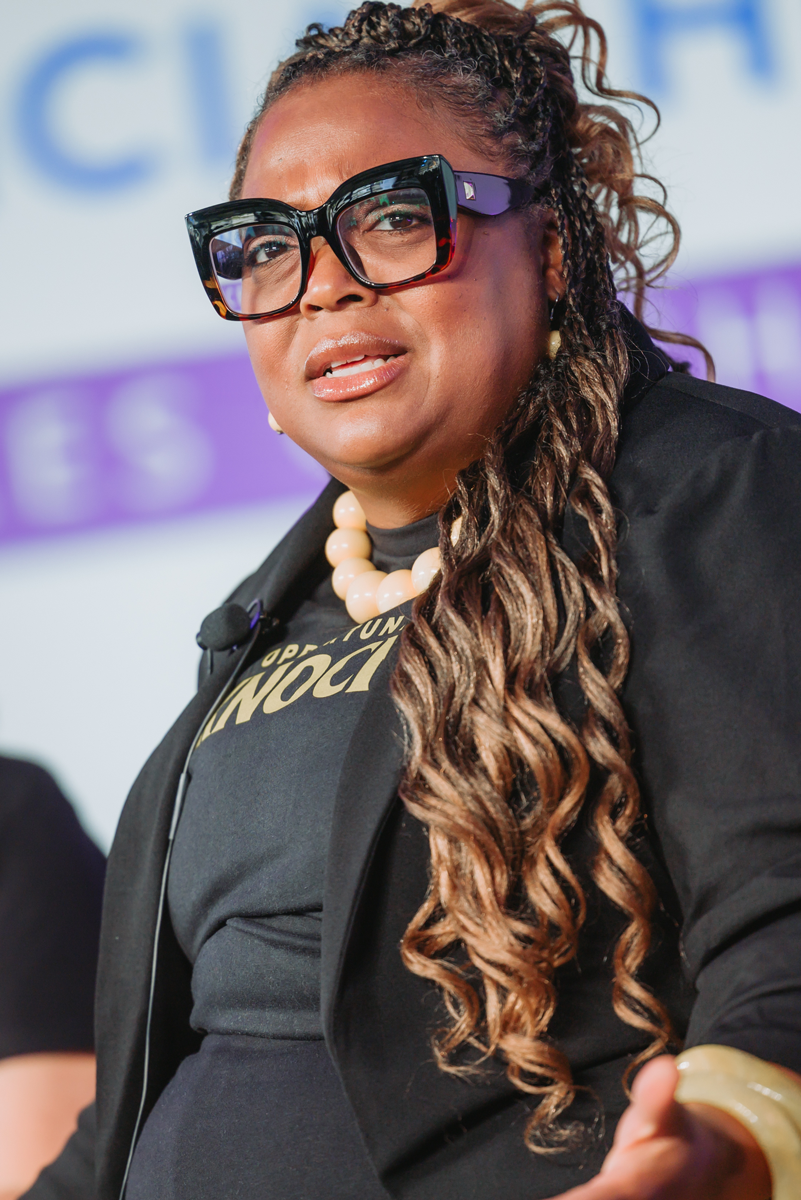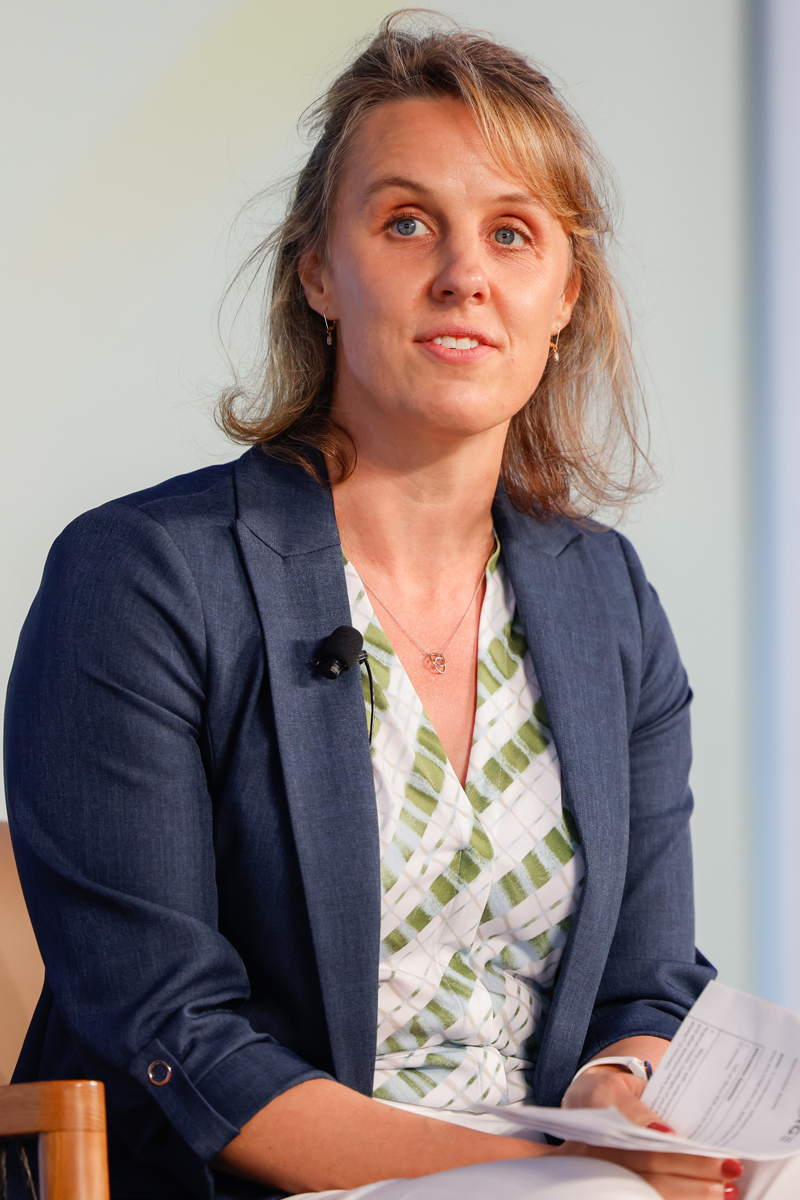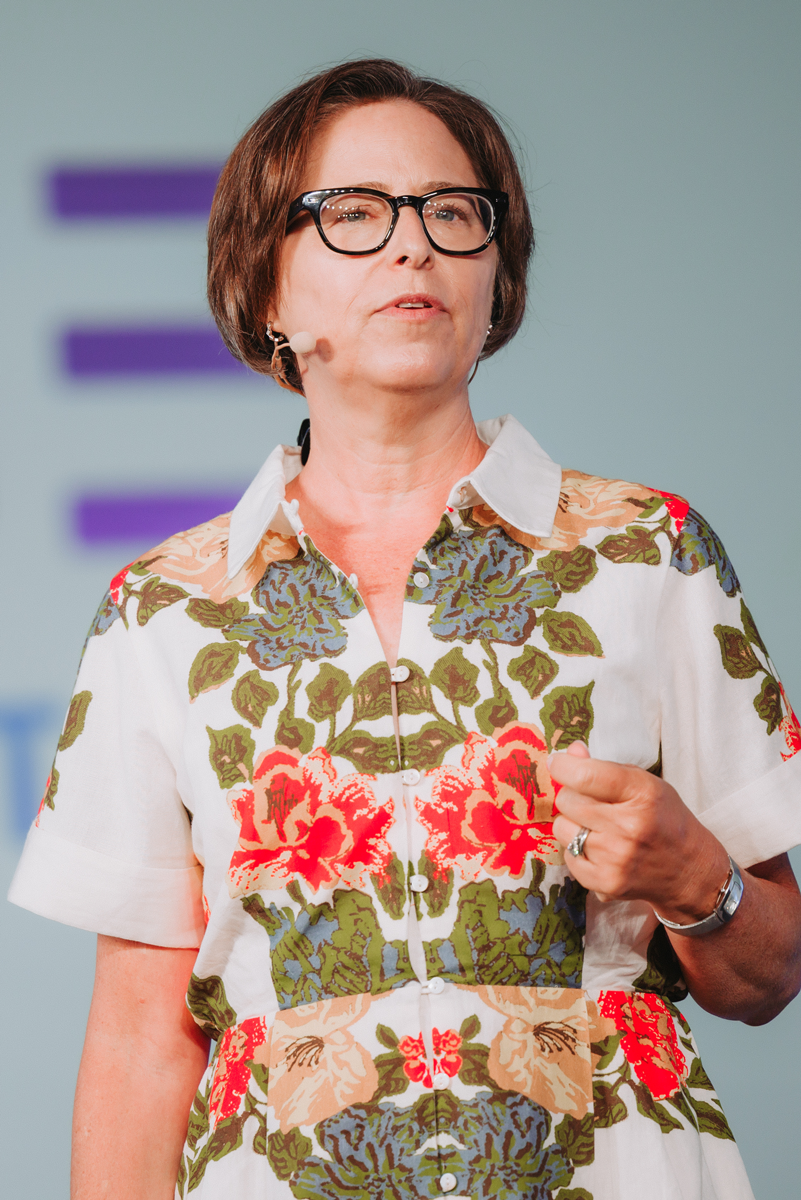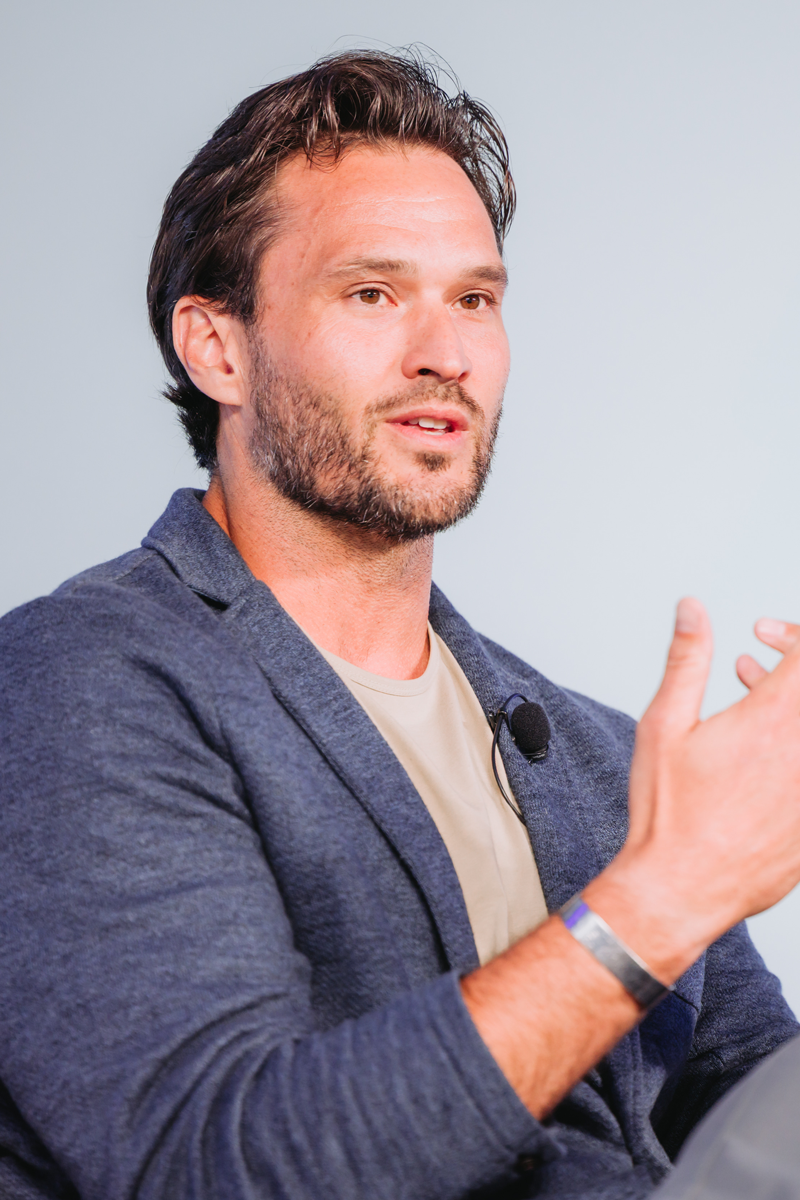From Voices to Action: 3 Takeaways From EMERGE 2025
This year’s EMERGE centered voices impacted by today’s cultural and economic shifts, informing our path toward a better financial future for all.
By Financial Health Network
-
Program:
-
Category:
-
Tags:

At EMERGE Financial Health 2025 last month, hundreds of cross-industry leaders gathered in San Diego all focused on a single goal: building a more inclusive, resilient financial future.
This year’s EMERGE theme, Voices of Change, elevated first-hand consumer experiences to remind us that financial health isn’t just about numbers – it’s about understanding and uplifting the lives behind those numbers. Hearing stories of resilience in the face of daily financial instability and systemic barriers revealed what it truly takes for communities to thrive—and showed clear pathways for providers, employers, and advocates to lasting impact.
As we look ahead to the remainder of 2025 and beyond, these voices will continue to shape our path forward. Below, we share three key takeaways from EMERGE that your own organization can put into practice to improve financial health for all.
1. Listen and Learn from the Community
Financial health is inherently personal, shaped by factors such as race, gender, age, geography, and ability. These intersecting dimensions influence not only how people manage their finances, but also the types of support needed to achieve stability and long-term resilience. Our solutions must also be grounded in a deep understanding of their lived experiences, meeting people where they are.
This principle was reaffirmed at EMERGE 2025, where speakers offered candid reflections on both challenges faced as well as progress made. Consumers continue to work tirelessly to build financial security for themselves and their families, and they seek institutions – whether employers, financial providers, or community organizations – that serve as true partners in their efforts.
As people navigate a changing economy, rising climate threats, and an uncertain future, their financial needs are evolving, too. Through methods like conducting listening sessions, measuring customer and worker financial health, and exploring broader market trends, we can begin to understand these shifts in real time and design solutions that are relevant, personalized, and effective.
Related Voices
-
- In Aging as a Force for Community Transformation, Raymond A. Jetson, Vision and Advancement Catalyst at Aging While Black, challenged attendees to reconsider who we look to for guidance in building financial solutions. “Black Elders may not have the title or the platform, but they have the wisdom,” Jetson said.
- As climate events become more frequent, their financial impact is harder to ignore. During Financial Resilience in the Face of Natural Disasters, panelists discussed the financial toll of these events on Americans. “We’ve seen the mortgage for a family of four in Louisiana go from $800 to $2,500… [because] their insurance has quadrupled,” said Adrienne Goolsby, Senior Vice President U.S. and Canada Operations, Habitat for Humanity International. “How can a single mother with three kids afford that?”
- “I never would have thought that going to a bank would help me get out of my situation,” Tiffany White, Associate Pastor, Lake City Church, shared in Opportunity Knocks: A Family’s Journey to Financial Health. Charles and Tiffany White’s story of overcoming financial hardship underscored that institutions have an opportunity to earn trust, educate consumers, and create mutually beneficial relationships.

“It was kind of embarrassing to find ourselves in such a predicament and needing help… We didn’t want the embarrassment. We knew that a lot of people look at you for your credit score… so we felt like if we just keep everything covered and we just keep surviving, we were going to be okay. But that was not okay.”
Tiffany White, Associate Pastor, Lake City Church
2. Embed Financial Health Into Business DNA
There is growing consensus that businesses must intentionally integrate financial health into their core strategies—not just as a moral imperative, but as a driver of measurable business outcomes Whether it’s flexible payment options built into products or financial-wellness benefits for employees, these practices help deepen loyalty, reduce friction, and strengthen organizational resilience.
At EMERGE, trust surfaced as an important throughline through which to view this work. In a world of climate shocks and shifting regulations, customers and employees alike want to know their institutions have their backs.. Leaders across sectors agreed: Rebuilding trust requires empathy, accountability, and a deep commitment to financial health at every level of decision-making. This means rethinking team structures, delivery models, and performance metrics through the lens of consumer well-being – an approach that also supports business success.
The FinHealth Standards, a new Financial Health Network initiative launched at EMERGE, offer providers one place to start. As the first framework designed to help financial institutions embed financial health into the core of their products, the Standards provide evidence-based practices for building credit cards, checking accounts, and other tools that truly meet people’s needs.
Related Voices
-
- “We are shifting from measuring just product sales to measuring customer outcomes,” said Peter Jacobs, CEO of ING Netherlands, in Charting the Future of Financial Health. “It’s not enough to sell a savings account, we want to know if people are actually saving. That’s how we start to make financial health part of the DNA of banking.”
- During The Power of the Worker Voice, we heard Sandra Klausmeyer, Senior Vice President, Director of Strategic Initiatives, Bangor Savings Bank, highlight the company’s partnership with the Financial Health Network. Their partner research findings identified a clear and critical need: meet the living wage threshold. Benefits like HSAs and retirement plans can only have meaningful impact once basic income needs are addressed, Klausmeyer noted.

“We found over and over again that if we want to achieve the ultimate results that we’re seeking, going back to our employees and embedding it into our corporate culture is the key to getting us there.”
Sandra Klausmeyer, Senior Vice President, Director of Strategic Initiatives, Bangor Savings Bank
3. Take the Next Step
While customers navigate economic uncertainty, businesses also feel the strain. Shifting corporate priorities, regulatory rollbacks, and artificial intelligence’s dizzying evolution are making it harder than ever to stay focused on financial health.
One message from an EMERGE Member-exclusive whiteboard session, captured the sentiment clearly: “We can’t fix everything at once.”
The good news? We don’t have to.
Taking action on financial health doesn’t require an all-or-nothing approach. Speakers throughout the event underscored that small, targeted changes can drive outsized impact—like letting borrowers choose their payment date to reduce late fees and boost repayment.
Whether it’s a small product tweak, a feature update, or cross-team collaboration on a broader strategy, meaningful progress starts by identifying what matters most for your people and acting on it.

“My ask is by the end of the year, your institution commits to adopting at least one of the standards it isn’t yet meeting. When we come back together a year from now for our next EMERGE Conference, I want to be able to celebrate our progress in putting proven ideas into widespread practice and raising the bar for what good looks like.”
Jennifer Tescher, CEO, Financial Health Network
Financial health isn’t built overnight, but every effort counts. In a time of complexity and change, choosing a focused, intentional path forward can help leaders stay aligned with their mission while delivering real results for customers and communities.
Related Voices
-
- Leading with purpose at any organization begins with focused strategy. Tim Berry, Global Head of Corporate Responsibility and Chairman of the Mid-Atlantic Region at JPMorganChase, highlighted just this in his keynote, Financial Health at Scale: Leading with Purpose. Berry described the ways JPMorganChase is advancing financial health through a strategy that combines product design, community investment, and cross-sector collaboration.
- “We replaced all of our legacy automated support systems with generative chatbot and voicebot technology,” said Sam Kraus, Vice President of Operations and Member Experience at Chime, in Banking Through the Eyes of Community Members. “It’s been incredible. Members now have more conversational interactions, and we’ve seen a doubling in our customer satisfaction score for automated support.”
- “We have this cultural standard within Team Rubicon… when we are done working on a home, we will leave it clean, like TR [Team Rubicon] clean,” said former Marine, entrepreneur, and author, Jake Wood. In Service-Driven Change: Lessons for Financial Health, he shared how his commitment to service shaped Team Rubicon’s mission to help communities recover and rebuild after disasters. Wood emphasized that care and dignity must guide every step of the recovery process – a powerful reminder that even small acts of respect have a lasting impact, especially in times of crisis.

“If they come back and this house looks clean, like we really cared, like we went that extra mile, they’re going to remember that part of that moment in that journey.”
Jake Wood, Co-founder and Executive Chairman, Team Rubicon
Dive Deeper, Take Action
The Voices of Change have spoken. As a collective ecosystem committed to advancing financial health for all, we’re not only listening—we’re building. Explore EMERGE 2025’s full session recordings to recapture all the insights and inspiration. And stay tuned for updates on EMERGE 2026, taking place in Atlanta on May 19-21, 2026. Most importantly, consider how to let your people’s voices lead in the months ahead. We’re here to partner with you every step of the way.